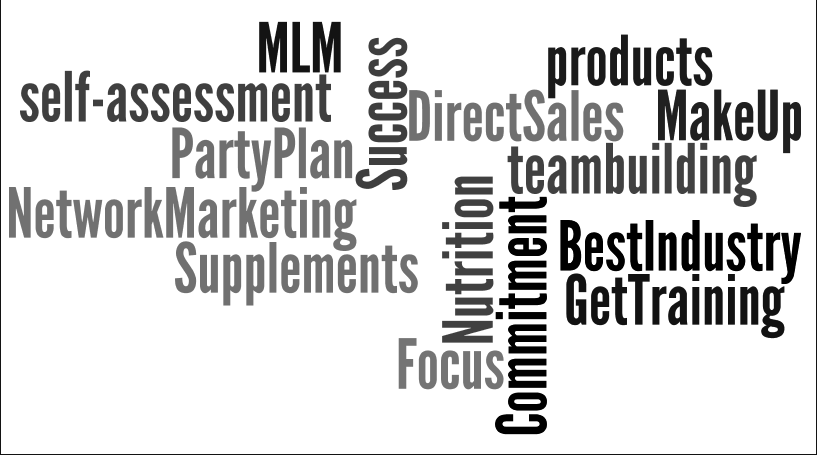
In Part 1, I suggested the future of employment is self-employment. More specifically, I highlighted the growing popularity of the direct sales industry. Several months ago, Jim Cramer, a host of CNBC’s Mad Money just three years ago said he was bullish on direct selling during a slowing economy because “it is a great model…with high gross margins, low capital intensity, lots of free cash flow.” This is still true in 2012.
Cramer made the additional point that breaking away from those typical job structures and creating your own stream of income puts you in the best position to weather an economic storm, simply because you are no longer dependent on a boss or on the economy to determine your annual income. Now, you determine it. Call it a new paradigm for the average salaried worker or the long-term unemployed.
The power of direct sales is that it allows you to plan by leveraging yourself to earn income today, tomorrow, and next week…to secure your income in perpetuity…income that continues coming in, over and over, long after you finished expending the effort and the capital it took to create the source of the income.
A little self-assessment can help you on the next point. People in direct selling typically share certain attributes. Most are looking for supplemental income either short term or long-term. And then there is the appeal of the social aspect for those like myself who thrive on meeting new people and buying new products I need with proven value at wholesale or discounted prices.
Did I hear you say, “I tried direct selling once and I did not make any money!” It’s just a scheme. Let’s see, the first time you tried to ride a bike without training wheels, did you fall – over and over as I did? Did you learn to swim immediately? Did you give up? I didn’t. Did you stop going to restaurants after not liking the food at one you visited before? Did you quit your job or stop going to school because you did not like your supervisor or a teacher? No! On all accounts, I would venture.
The history of industry is checkered and it is important to perform your due diligence. Success for most of us is work – hard work. It is about diligently, methodically, and relentlessly pursuing a goal – never giving up. Revisit “The Ant Philosophy” by Jim Rohn.
I will assume you are one of those rational, intelligent human beings who want logical, straightforward facts about how to get started. The key is finding the right company – among dozens available. The Direct Selling Association (DSA) is a great resource for learning more about the industry and individual companies.
Here are some criteria that the perfect sales company should meet. I shared this with colleagues more successful and more experienced than I am, and they agreed with me.
- A compensation plan and structure that offers a 50-50 partnership between the company and its members.
- The right product line.
- Due diligence.
- Structural up line coaching, training and support.
Here is a simple rule of thumb regarding compensation plans: Never consider a company that does not pay on 100 percent of the wholesale value of its products. I did not say UP TO 100 percent. I said ON 100 percent. I would avoid companies with a “breakage” account. This means the company has a way to pay you less than 50 percent in commissions.
A second major criterion to consider is the company’s product line. I would avoid huge product lines; it is confusing and it can cause delays in getting new members started. A large product line can slow the process of duplication. Duplication is the soul of the business and simplicity of product line leads to duplication. One of those more experienced and successful colleagues said, “a product line that is focused and easy to explain will normally generate the fastest growth.” Also, the products must bring value to the user.
I also prefer a company that offers international expansion – so the type of product is important. Your compensation has to be seamless i.e., I am a distributor or member in each country the company does business. There is no need to re-qualify in each market with a different compensation plan.
The third criterion is one that too many people overlook: performing due diligence. Listen to those with successful experience in the direct sales/NWM industry. You do this to minimize bad choices. In direct sales, there is something called the “Bandwagon Effect.” A new company’s name is topical, products are being touted by people you know or on the Internet and Facebook, and this new company is in the Pre-launch or Launch phase. A reminder: their products may be a perfect fit for your friends but not necessarily for you. Find a company with products you can become passionate about. Your passion will fuel you. Take your time; try to find the right fit!
Next, check with the U.S. Better Business Bureau, the State Chamber of Commerce and Better Business Bureau where the company has its headquarters. Does the company you have selected have a physical plant you can visit and speak to the owners and/or their representatives? Make it a point to visit; ask hard questions and satisfy your need to know.
Due diligence uncovers good information. The greater your depth of knowledge, the more informed choice you can make. The more confident you feel about your choice, the better you are able to navigate bends in the road in this industry that may appear to others to be the end of the road.
And, fourth, your up line support. You want experienced and successful people from the industry and, preferably, the company you choose training and supporting you. It is just more effective that way.
Finally, you’ve found a company whose products really fit for you. Don’t give up too soon or expect overnight success. I said earlier, success is about diligently, methodically, and relentlessly pursuing your goals – never giving up. Success in this industry comes as a result of consistent and effective effort duplicated over time. Business author Erin Casey advises those new to direct sales “not to base your potential for success on someone else’s failure, especially when there is so little to lose and so much to gain.”
Before I wrap this up, there is another point to make about the appeal of the direct selling industry to every age group. That is the philanthropic program the best companies support. They set up their own foundations, partner with humanitarian organizations, or regularly support existing charities. Times might be tough for the average individual but there is something uplifting about being able to help others in greater need. In large measure, the people who are attracted to and thrive in the direct sales industry are also people who make the world a better place.
Take a look! Decide if it is a fit for you.
